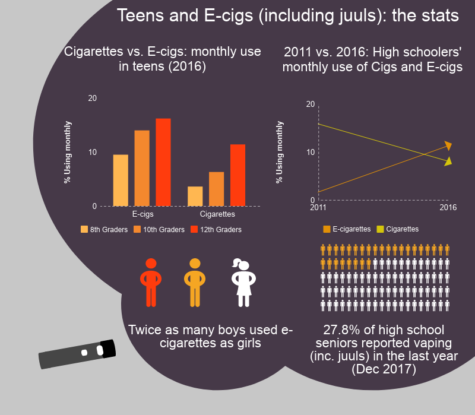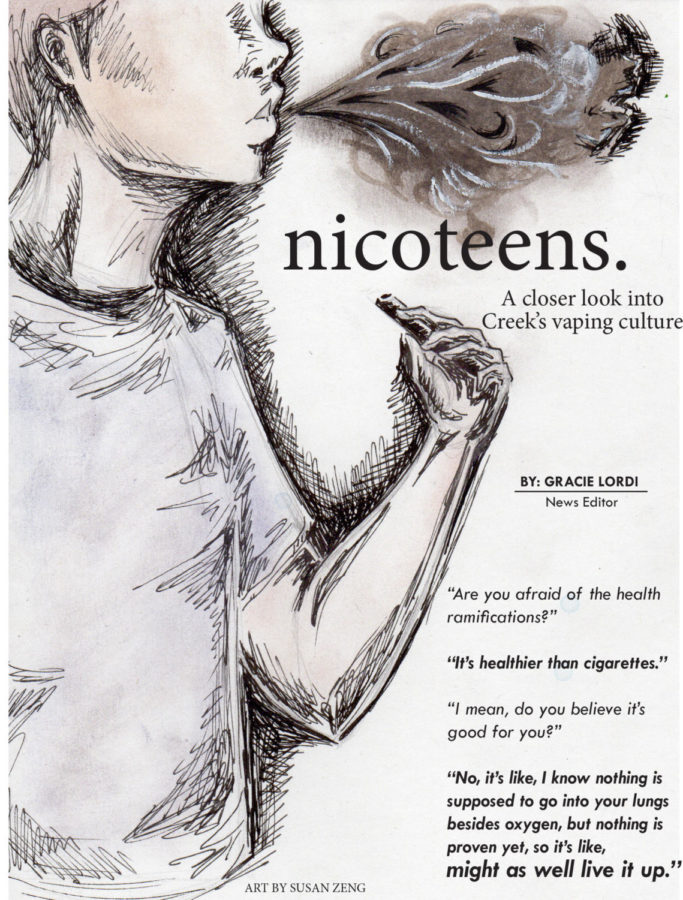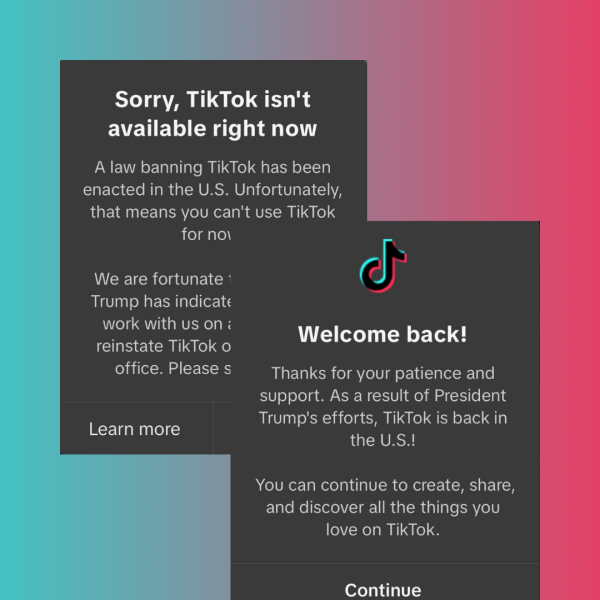nicoteens.
*Names have been changed for anonymity
Sophomore Andrew Jones* is like a lot of the other JUUL smokers at Creek.
Taking on risks without worrying about the consequences.
In 2017, over 1 million JUUL units were sold, generating over $224 million in sales.
Last year Creek only had 11 tobacco suspensions but as of Feb. 20, the rate has more than tripled to 37 tobacco suspensions, according to Kevin Uhlig’s Administrative office.
Students continue to take advantage of the simplicity of purchasing “pick-me-up” drugs such as nicotine at the risk of their health and at the risk of suspension.
The legal age of purchasing cigarettes and e-cig products is 18 years old. Although few students at Creek are 18, having an older sibling or friends makes buying nicotine products simple.
Even a parent could supply a student’s nicotine needs.
“My mom bought me my JUUL and buys my carts,” Sophomore Mia Brown* said. “It’s not that crazy, she is just glad that I found a healthier alternative to smoking cigarettes.”
Many students who are suspended for juuling or vaping are suspended on the grounds of tobacco prohibition. This can be confusing because many electronic cigarettes and JUULs do not contain tobacco.
The Colorado Revised Statute makes this clear stating, “A prohibition of the use of all tobacco products, the definition of which includes electronic cigarettes and similar devices, on the grounds of secondary education facilities.”
In other words, there’s an umbrella above prohibited products when they say tobacco, and not all the products have to contain tobacco.
The phrase “on the grounds” in that law means something different than what many students may think.
The zoning extends 1,000 feet around school property, which for Creek reaches to about the Tokyo Joe’s on Yosemite and Belleview.
This is a problem for students who think smoking at King Soopers or Subway keeps them safe from violating the law when it’s just as illegal as if they were doing it at school.
“The state of Colorado says that, not only do you have to be 18 to use tobacco, but more importantly, you cannot be within 1,000 feet of a school when you use tobacco,” Uhlig said.
Compared to the other disciplinary issues Creek struggles with, tobacco cases are consistent and frequent.
“Nicotine is pretty cut and dry. There’s a policy around it that if you’re in possession, we notify the police,” Uhlig said.
“People want to escape. Just like alcohol and other drugs, the high is
what they want.”-Sophomore Mia Brown*
Hence the 37 suspensions this year.
Non-smokers in the Creek community believe that the main reason juuling and vaping are so popular is because it’s trendy and has somewhat of a bandwagon effect.
“Kids that juul, most of them, right now are caught up in a fad and it’s the cool thing to do at this time in their life,” Assistant Athletic Director Mark Goldsberry said.
The “trend”, however, isn’t appealing to everyone. To students who don’t juul, there is no incentive to try it, even if their friends are.
“It’s a trend and it’s the cool thing to do,” Senior Jacob Bolin said. “I don’t think less of them, I just wouldn’t do it myself, but I would be friends with them.”
Junior Dani Jaime agrees.
“I don’t do it cause it’s dumb. Like, you need that to feel or think you’re cool? That’s sad,” Jaime said.
Brown believes the buzz or psychological effects of juuling are the fuel of why people do it.
“People want to escape,” Brown said. “Just like alcohol and other, drugs the high is what they want.”
Jones agrees. He doesn’t do it for any trends or to be liked, but for the feeling.
“I don’t do it for anyone else but me,” Jones said. “I just feel like happy and hyper and dazed all at once. Sometimes I do it when I’m doing work and it sharpens everything.”
According to the National Institute on Drug Abuse (NIDA), nicotine is a unique drug as it is both a sedative and a stimulant.
When someone uses nicotine, dopamine is released causing both pleasure and motivation.
True to Jones’ comment about an increase in focus.
As well as dopamine, nicotine use causes a rush of adrenaline.
This factor is important to understand when analyzing the psychological effects of nicotine because students not only experience the adrenaline from the drug but the adrenaline of doing something illegal.
While rumors circulated among students regarding tobacco detectors such as FreshAir and TobacAlert, administration debunks the gossip.
“We have nothing like that,” Uhlig said.
Administration is looking towards less punitive measures and a more preventative stance on the tobacco issue.
“We’ve talked with Greenwood Village police officers about other kinds of diversion programs,” he said. “Currently we don’t have anything like that in place.”
As suspensions and nicotine sales continue to increase at an exponential rate, administration and law enforcement are looking at how to reduce these numbers.
“The bottom line is that kids need to know that it’s not appropriate. Whether it’s a vape or a JUUL or a cigarette, on school grounds,” he said. “There are consequences.”
Aside from the psychological and legal consequences of teen vaping, there are the physical repercussions as well.
Because vape and JUUL products are relatively fresh on the market, not much information has surfaced on the long-term effects of using the products.
However, new studies have been rolling in regarding everything from the dangerous chemicals in vape flavorings and arsenic and lead being found in the vapor released.
In many vape flavors, a chemical known as diacetyl is present and causes an incurable disease known as popcorn lung.
Found first in butter-flavored popcorn, it’s absolutely safe to eat and drink, but when inhaled can cause irreversible scarring of lung tissue and shortness of breath or difficulty breathing.
According to a study by Johns Hopkins Bloomberg School of Public Health, significant levels of chromium, manganese, nickel, and lead were found in samples of vape products.
The study explains that this is caused not by the vape juice, but the device itself. Many devices contain a coil used to heat up the juice and turn it into vapor.
The study shows that some coils are now releasing toxic metals that are being inhaled into the lungs of a user.
As these new studies begin to surface, people have become more aware of the long-term effects.
“Later down the line they will start to see the health ramifications,” Goldsberry said.
 Infographic by Ben Sampson
Infographic by Ben Sampson











